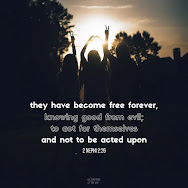In Alma 42, Joseph Smith attempts to solve the problem of blame and the Garden of Eden, an approach that he brings into focus in the Book of Moses.
 |
| It may be an ideal--it is an extraordinary one. |
Joseph Smith’s approach to the problem of God, original sin, free will, and judgment is to do the following:
(1) Take free will to its logical conclusion: in sum, the whole point of life is for humans not just to have free will but to exercise it as a reflection of each human's individuality (to be "agents unto themselves");
(2) Negate the idea of inherited sin and define sin as contingent on knowledge (hence, all children are saved);
(3) Distinguish between “sin” and “transgression.” Adam and Eve didn’t yet know good from evil so they transgressed when they ate the fruit; they didn’t sin. They left the Garden of Eden because they needed to go. As mortal beings, they did eventually sin. But they weren’t inherently corrupt and neither are we. Messing up is normal. God already figured that out.
Hints of the above approach appear in Alma 42.
Alma 42 first addresses antinomianism, likely because it is about to present what others would call antinomian arguments. So it first argues that God is just (fair) and consistent. Mercy can't override justice.
The chapter goes on to present in outline, material that will appear in the Book of Moses, presented by Joseph Smith in the 1830s. In Alma 42,
- Adam and Eve become “as God,” knowing good from evil.
- They are “sent forth” from the presence of God, so they will die physically, which requires (“it was expedient”) a universal resurrection.
- They are separated temporally and spiritually from God, which requires an atonement.
- Sins arise from specific decisions made by individuals as they, expediently, “follow after their own will"—not from God’s punishment.
 |
| A VERY Mormon view of Adam and Eve |
There is more than a hint of “it had to happen this way, so it could happen this way, so God could reveal His power”--a not unusual argument in the nineteenth century (and earlier). Joseph Smith's approach to the Garden of Eden will later be brought more in line with 2 Nephi 2:25 (hinting at Adam as Michael and ultimate hero):
“Adam fell that men might be, and
men are that they might have joy.”
“And now,” Alma writes his son, “I desire that ye should let these things trouble you no more” (Alma 42:29).
When Joseph Smith can side with actual reality over theory, he usually almost always does. After all, telling God who and when and why He can save is completely unnecessary. And possibly blasphemous.
On the other hand, having a story about God (myth = story; theology = argument in a positive sense) does influence HOW people carry out their beliefs in actual reality. Joseph Smith splits the difference.
No comments:
Post a Comment